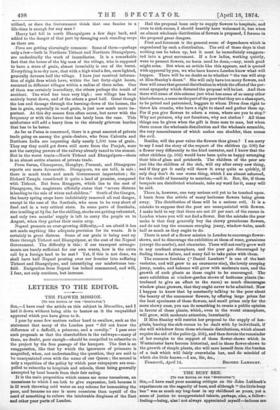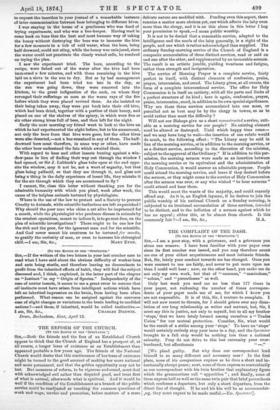THE BUSY BEE.
[TO THE EDITOR OP THE SPEomfame."]
have read your amusing critique on Sir John Lubbock's experiments on the sagacity of bees, and although "the little busy bee" was as much my bug-bear in my childhood as yours, yet a sense of justice to unappreciated talents, perhaps, also, a fellow- feeling—being, alas! not always appreciated myself—induces ma to request the insertion in your journal of a remarkable instance -of inter-communication between bees belonging to different hives.
I was staying in the house of a gentleman who was fond of trying experiments, and who was a bee-keeper. Having read in some book on bees that the best and most humane way of taking
-the honey without destroying the bees was to immerse the hive for a few moments in a tub of cold water, when the bees, being
-half drowned, could not sting, while the honey was uninjured, since the water could not penetrate the closely waxed cells, he resolved on trying the plan.
I saw the experiment tried. The bees, according to the recipe, were fished out of the water after the hive had been
immersed a few minutes, and with those remaining in the hive laid on a sieve in the sun to dry. But as by bad management the experiment had been tried too late in the day, as the sun was going down, they were removed into the kitchen, to the great indignation of the cook, on whom they revenged their sufferings as soon as the warm rays of the fire before which they were placed revived them. As she insisted on their being taken away, they were put back into their old hive, which had been dried, together with a portion of their honey, and placed on one of the shelves of the apiary, in which were five or • six other strong hives full of bees, and then left for the night.
Early the next morning my friend went to look at the hive on which he had experimented the night before, but to his amazement, not only the bees from that hive were gone, but the other hives -were also deserted,—not a bee remained in any of them. The half- drowned bees must therefore, in some way or other, have made -the other bees understand the fate which awaited them.
With regard to bees and other insects buzzing against a win- dow-pane in lieu of finding their way out through the window I had opened, or Sir J. Lubbock's glass tube open at the end oppo- site the window, may it not be, not a want of sagacity, but that glass being pellucid, so that they see through it, and glass not being a thing in the daily experience of insect life, they mistake it for the air through which they are accustomed to fly ?
I cannot, Sir, close this letter without thanking you for the admirable humanity with which you plead, week after week, the -cause of the helpless animals tortured by physiologists.
Where is the use of the law to protect and a Society to prevent -Cruelty to Animals, while scientific barbarians are left unpunished?
Why should the poor man who skins a cat alive be imprisoned for a month, while the physiologist who produces disease in animals by the cruelest operations, meant to induce it, is to go scot-free, on the
plea of scientific investigations ? There ought to be one law for the rich and the poor, for the ignorant man and for the scientific. And God never meant his creatures to be tortured for months, to gratify the curiosity of man, or even to increase his cbirurgical



































 Previous page
Previous page